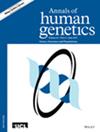NLRP13 inflammasome complex is hypermethylated in familial Mediterranean fever and global methylation correlates with the disease severity
Abstract
Familial Mediterranean fever (FMF) is an autoinflammatory disease caused by variations in the MEFV gene, which encodes the pyrin protein, a member of the inflammasomes. Despite the complex pathogenesis of FMF, epigenetic changes also play roles in the disease progression. In our previous study, we observed a relationship between NLRP13, which is one of the members of the inflammasome complex and has a pyrin domain in its structure, and the MEFV gene using the STRING database. In this study, we examined NLRP13 expression and methylation status in 40 patients with FMF attack and 20 healthy individuals. We then investigated the global DNA methylation status of patients with FMF in the attack period and control groups. We further examined the relationship between the clinical manifestation and global methylation as well as NLRP13 gene expression of patients with FMF and healthy individuals. As a result, we showed that hypomethylation in patients with FMF leads to different clinical outcomes in terms of disease severity. In addition, the data indicated that NLRP13 inflammasome is epigenetically controlled in patients with FMF and the presence of amyloidosis may affect the hypermethylation of this gene. Moreover, NLRP13 was silenced because of the hypermethylation of the promoter. The increase of methylation level at the promoter region participated in the inactivation of NLRP13. In the current study, we not only found a new gene that plays a role in the pathogenesis of FMF disease, but also new evidence for the epigenetic regulation of the disease.

 求助内容:
求助内容: 应助结果提醒方式:
应助结果提醒方式:


